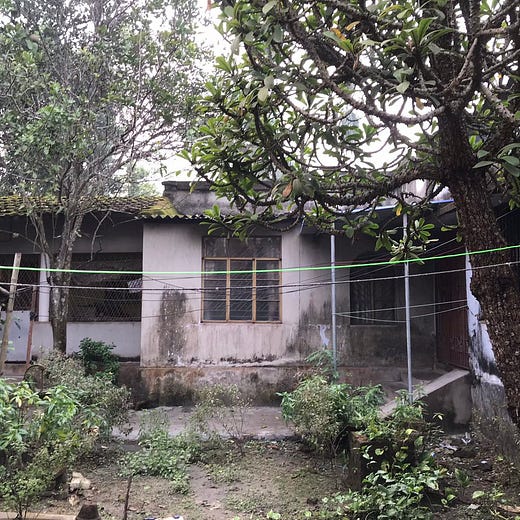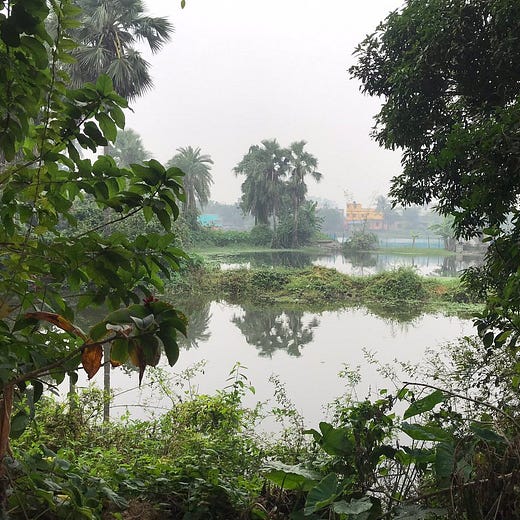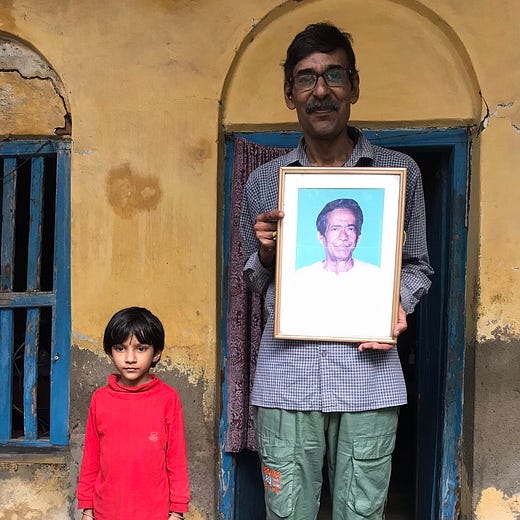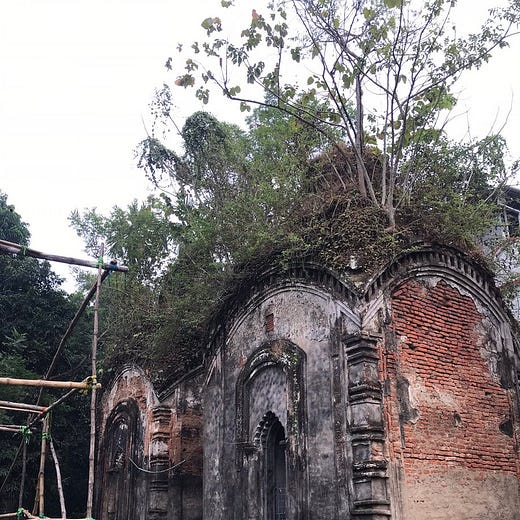The India Cable: Rajan Goes Viral, Court Trashes ‘Love Jihad’, Amit Shah's food fight with Didi
Plus: India choosing vaccine Plan B, Tarun Gogoi dies of Covid, Delhi Crime wins Emmy, and the house where Pather Panchali was shot
From the founding editors of The Wire—MK Venu, Siddharth Varadarajan and Sidharth Bhatia—and journalists-writers Seema Chishti, Sushant Singh and Tanweer Alam. Editor: Pratik Kanjilal
Snapshot of the day
November 24, 2020
Pratik Kanjilal
Days after Prime Minister Modi called for an ‘integrated approach to combat climate change’, it has emerged that the Environment Ministry is diluting assessment procedures that study possible ecological damage and its social impact, ostensibly in a bid to speed up infrastructure projects. Meanwhile, the Mizoram government has decided to ban fireworks on Christmas and New Year’s Eve to curb air pollution, which could aggravate respiratory problems of Covid-19 patients and others.
In Washington, Donald Trump has accepted that the transition to Joe Biden’s administration must begin, but he will keep up the legal battle against his electoral loss. In Bihar, as the newly elected Assembly convened for its first session, Shakeel Ahmed Khan of the Congress took his oath of office, as an MLA from Kadwa in Katihar district, in Sanskrit. Fellow members applauded the former JNU students’ union president. Indian military officials who liked to blame all their problems on the babu, a pejorative term for the civilian bureaucrat, now realise that having a general ― and particularly, Bipin Rawat ― as secretary of the new Department of Military Affairs, has only worsened the situation in promotions and postings of military officers.
Travelling to Maharashtra from Delhi, Gujarat, Rajasthan and Goa? No entry without a Covid negative report. At least five persons died due to Covid-19 every hour on average in Delhi in the last 24 hours. Oxford Languages, publishers of the Oxford English Dictionary, have forgone the selection of a single word in favour of highlighting the pandemic’s swift and sudden linguistic effect on the English language.
The second largest radio telescope in the world, located in Puerto Rico, is shutting down. The loss of the Arecibo Observatory will be a big blow to the astronomy community. A deep depression over the southwest Bay of Bengal is intensifying into Cyclone Nivar, which is set to make landfall on the coast of Tamil Nadu and Puducherry this evening, and could cause heavy rains. Check here for the latest from the India Meteorological Department.
The RBI on Monday asked banks not to approve any proposal from foreign law firms to open a branch office, project office or liaison office in the country under FEMA. Prime Minister Narendra Modi is now forced to tread a different path in the post-Trump era, reports the Financial Times, as Biden’s victory, the China stand-off and the missed Asia trade deal have “made New Delhi vulnerable”.
Union Minister for Information and Broadcasting Prakash Javadekar says that the freedom of the press must be preserved at any cost in a democracy, but the media should remember that freedom comes with responsibility. The minister is channelling his inner Uncle Ben (“With great power comes great responsibility.”) but we remember another old saying to the effect that anything preceding a ‘but’ in a sentence has no value. But then…
Tarun Gogoi, three-term Chief minister of Assam, former Union minister under PV Narasimha Rao and General Secretary of the All India Congress Committee under Rajiv Gandhi, has died of multiple organ failure while being treated for Covid-19. As CM, he brought several militant organisations including the United Liberation Front of Asom (ULFA) to the negotiating table, ending a long period of lawlessness in the state.
And Richie Mehta’s Delhi Crime, which streamed on Netflix, has won the Emmy for Best Drama.
Rajan goes Viral, economy goes nowhere
Former Reserve Bank of India governor Raghuram Rajan and former deputy governor Viral Acharya have said that the proposal to licence Indian business houses to run banks is a bad idea. In an article published jointly on LinkedIn, Rajan and Acharya have termed this “disastrous” and argued against the recommendation, in a report by an internal panel of the RBI, warning of ‘connected lending’ and concentration of funds. The idea of bank licenses for corporates has come under fire since some of them already own non-banking financial companies which have been found to be illegally lending to related parties, leading to siphoning of public money of thousands of crores.
Labour markets are signalling stress, with statistics indicating substantial slowing of the economy in November. Chief Economic Advisor Krishnamurthy Subramanian, never failing to puzzle the world, has said at a CII event that the government is “converting the Covid crisis into an opportunity by focusing on labour-intensive economic growth”. In a shocking reversal of all he had maintained earlier, he said that demand is the name of the game: “For sustained growth to happen, demand must be created. In countries that have grown at 5% for a decade, they have seen an increase in wages and employment. People had disposable income, and that is how growth was sustained.”
Sustaining the spiel, Finance Minister Nirmala Sitharaman assured India Inc that the momentum of economic reforms would continue to make India a hot destination for global investment. India has turned the crisis created by the pandemic into “an opportunity” to push reforms, which had apparently remained pending for decades. Phrases like “the economy is facing a reset exercise” have gained currency these days. But the reality is that the Modi government raised diesel and petrol prices for the fifth consecutive day on Tuesday, further squeezing the consumer.
Hard work doesn’t pay
Nearly 40% of workers who have opted for wages through biometric authentication under the MGNREGA face failure once in every five transactions, according to a study titled ‘Length of the Last Mile: Delays and Hurdles in NREGA Wage Payments’ by LibTech India. The main reason: erosion of fingertips due to manual work, machine malfunction and feeble Internet connectivity.
Foreign brief
On Monday, the Foreign Secretary briefed envoys of key G8 nations, including the US, Russia, France, and Japan, on the attack planned by Pakistan-based terrorist group JeM in Nagrota in Jammu, which was foiled by security forces on November 19. Heads of missions were provided with a comprehensive “information docket” giving the details of the incident and the list of items and ammunition recovered from terrorists, clearly indicating their Pakistani origin. Is this simply an Indian dossier to beat the Pakistani one, as the two neighbours jockey for position to engage with a new US administration, or the prelude to something else? The question is, will Anthony Blinken, nominated US Secretary of State by Joe Biden, attempt to broker peace between India and Pakistan once again, as he tied to do in 2015, when he was deputy secretary of state in the Obama administration?
Any expectation of fireworks between India and Pakistan during the virtual Shanghai Cooperation Organisation (SCO) summit on November 30 are futile as the prime ministers of both countries are skipping the meet. Even though India is the current chair of the eight-nation SCO, Prime Minister Modi has chosen to visit his constituency instead of attending the meet, where Vice President M Venkaiah Naidu will represent India. Russia and China are other major members of the grouping.
Meanwhile, adding to the signs that there is no winter thaw in Ladakh, Chinese state media reports that thousands of tonnes of goods ― the last batch of supplies before the bitter snow season begins ― were loaded onto hundreds of heavy trucks before the winter weather cuts off traffic, and delivered to Chinese soldiers stationed at remote Himalayan outposts, to help them endure the harsh winter months in the border confrontation with India.
Just love
In a big blow to the UP government’s proposed anti-conversion law, the Allahabad High Court division bench held that an earlier single-judge judgment, which found religious conversion solely for the purpose of marriage unacceptable, is bad in law. Its order speaks of “mature individuals” and “freedom of choice as to whom they would like to live with”, and holds that “to disregard the choice of a person who is of the age of majority would not only be antithetic to the freedom of choice of a grown individual but would also be a threat to the concept of unity in diversity.”
The court has confounded the Yogi Adityanath government, and perhaps even that of neighbouring Madhya Pradesh, which has moved against characters from a novel kissing in the Netflix series A Suitable Boy. An FIR has been filed against two employees of Netflix, alleging that scenes in which the characters Lata and Kabir kiss promote ‘Love Jihad’. After the Allahabad ruling, it is clear there is no legal sanction for the drive to enact laws against the bogey of Love Jihad. The New Indian Express and The Telegraph have run editorials lambasting these planned laws but there is little chance of the BJP kissing goodbye to this politically-driven move.
The Long Cable
Vaccination: India opting for cheaper Plan B
Sushant Singh
Prime Minister Narendra Modi will hold virtual meetings with chief ministers and other representatives of states and Union Territories today to discuss the national vaccine distribution strategy. It’s a little late in the day, since the lives of 1.4 billion people are at stake, but the timing is perhaps dictated by much-publicised reports of the success of at least three vaccines. The US government is starting vaccinations from December 11, with the vaccine produced by Pfizer and its German partner BioNTech. Moderna Inc is expected to seek separate approval for its vaccine later in December. In the UK, the vaccine developed by the University of Oxford has made substantial progress.
The vaccines produced by Moderna and Pfizer-BioNTech require ultra-cold storage, but the Oxford vaccine can be kept in a conventional fridge used to store vaccines around the world, and has a shelf life of up to six months. The Oxford vaccine, unlike the other two, is already a part of Covax, the global initiative anchored by the WHO, the European Commission and France, which hopes to distribute two billion doses to 92 poorer countries at $3 per dose. As part of that arrangement, the Serum Institute of India is producing one billion doses under licence for India and other low-income countries.
But the vaccine India is banking on is Covaxin, which is being developed by the Indian Council of Medical Research (ICMR) and private pharmaceutical company Bharat Biotech. Third stage trials started this month. This was the vaccine Union Health Minister Harsh Vardhan referred to on Sunday when he spoke of “indigenous vaccines” and the completion of “our third-phase trials in the next one or two months”. The date of completion of third-phase trials is not certain, as Bharat Biotech said on Friday that results of the late stage trials were expected only between March and April.
There are other unanswered questions. Bharat Biotech said on Sunday that the vaccine is expected to be 60% efficacious, and certainly more than 50%, which is poor in comparison to the 90%-plus efficacy of foreign vaccines. The company has also said the vaccine will be rolled out around June 2021 for distribution, after securing necessary approvals.
Despite all these issues, why is the Modi government so keen on the indigenous Covaxin over the seemingly more robust foreign vaccines, such as the ones developed by Pfizer or Moderna? (Caveat: All we have so far are claims by the developers, none of which have been peer-reviewed). The main criterion is the price per dose and the budget needed to vaccinate every Indian. The Russian Sputnik vaccine developer states it bluntly:
A dose of the Oxford vaccine would cost Rs 1,000 when produced in India, or $13.50, and even in bulk purchase by the government with 50% discount, it would cost Rs 500 per dose. Even the subsidised Oxford vaccine, at $3 per dose, is too expensive for a national vaccination programme, and in any case the subsidised output is to be apportioned between 94 countries. “If we’re talking about national programmes and immunising everybody in the country, we are going to need something under a dollar a dose, preferably under 50 cents,” says Gagandeep Kang, who was recently chair of an ICMR panel on Covid-19 drugs and vaccines. Her exit was read as a protest against the confused Covid-19 response of the government.
India is thus looking at an option which costs less than Rs 75 per dose, preferably even under Rs 35, to undertake mass vaccination. A foreign developer is unlikely to agree to that price point, and this is pushing the Modi government towards a cheaper but less reliable indigenous option.
The third issue is of production capacity for the vaccine to be produced very quickly for 1.4 billion Indians. Even Serum Institute, the world’s biggest vaccine manufacturer, will only be able to produce 400 million doses by July 2021, and augment capacity thereafter.
Does this mean that no one in India will get any vaccine anytime soon? That is not the case. Serum Institute’s CEO said on Friday that the Oxford vaccine could be delivered to Indian healthcare workers and the elderly by January, but there is no official communication from the government. It may be granted emergency use authorisation if the vaccine gets such approval from the UK government, Vinod Paul, chairman of the National Expert Group on Vaccine Administration for Covid-19, said on Saturday. The Serum Institute is likely to apply for emergency use of the Oxford Covid-19 vaccine in December. If Bharat Biotech applies for emergency use approval after publishing its data from Phase 1 and 2 trials, the regulator can consider giving it approval for emergency use. In such a case, two vaccines could be available for emergency use by February.
Harshvardhan had also said in September that the government could opt for emergency vaccine authorisation, particularly for the elderly and people in high-risk roles. The list of 30 crore Indians for priority vaccination comprises four categories of beneficiaries: around 50-70 lakh healthcare professionals, over 2 crore frontline workers and armed forces, and around 26 crore people who are over 50 years of age, as well as people below that cutoff, but with co-morbidities. This would mean 600 million doses of the vaccine, so the emergency usage of the Oxford vaccine, from January 2021, could be limited to healthcare professionals and frontline workers.
For the rest, it is going to take a lot more time, and far greater clarity than is available today. If there is no clarity from the government, people will be at the mercy of Big Pharma, which could flog vaccine doses at exorbitant rates, to be administered by private hospitals with inflated service charges. In that case, the voiceless poor would continue to suffer while the chattering classes buy their way out of the pandemic ― yet another hallmark of Modi’s ‘New India’.
Reportedly
A minor controversy has been kicked off by a recent book, which explores the question of a conspiracy to bring down the Babri Masjid. A Times of India story about Jugalbandi, which is about the BJP before Modi, said that the author Vinay Sitapati, who teaches at Ashoka University, had concluded that there was no conspiracy. That puts the author in the same bracket as the CBI court judge who let off all the accused in September. But Sitapati now says that the TOI story is misleading. His position is that the conspirators, “Shiv Sena, Bajrang Dal, sadhus etc. might have stopped listening to Advani, Vajpayee, even RSS. BIG DIFFERENCE!”
Maybe there is a conspiracy ― a conspiracy to confuse.
There is more in the book on how the RSS wanted former prime minister AB Vajpayee “to break up his relationship with Mrs Kaul, or just marry her.” When he remained defiant, “they kept quiet as he was their ticket to power.”
Cabbage, aaloo, posta, and an elusive Brahmin cook
The battle for Bengal, where state elections are due in May 2021, had always promised to be nail-biting. But the cup of excitement is already bubbling over. Terming Union Home Minister Amit Shah’s recent visit to a tribal family in West Bengal’s Bankura a “show-off” event, Chief Minister Mamata Banerjee on Monday alleged that the lunch he had there was prepared somewhere else by a “Brahmin cook”. Feluda would be impressed by Didi’s methods. “There were visuals showing the Dalit family cutting cabbage and coriander, but none of these were seen (on his plate). He had eaten Basmati rice, posta bora (poppy seed fritters),” she said, adding that after having lunch he went away. “There was a child suffering from thalassemia or some disease, whom he didn’t meet.” In a separate food fight, Didi also took on the Centre for its amendment to the Essential Commodities Act, which no longer includes potatoes and onions. She termed the Centre “aaloo ki sarkar” (government of potatoes). The term ‘aaloo’ has ribald connotations in subaltern Bengali.
Trains running in Punjab
Train services were partially restored today in Punjab, exactly two months after they were discontinued on September 24 in the wake of a ‘rail roko’ agitation by angry farmers’ unions protesting against the three Central farm laws. The Railways have first resumed freight and goods train movement. Passenger train services would be restored in a phased manner over the next few days, starting tonight. Earlier, in a controversial move, the Railways had defiantly stopped even goods traffic to Punjab, though farmers were giving them safe passage. Then, it had to be all or nothing.
Prime Number: 404A total of 404 trees are being transplanted (i.e. uprooted) to make way for the new Parliament in the capital. While approving the redevelopment project, the Environment Ministry had said that only 233 trees would be transplanted. Delhi Crime wins Emmy
The prestigious International Emmy for Drama Series 2020 has been awarded to Delhi Crime. Directed by Richie Mehta, and with the lead played by Shefali Shah, it is a fictionalised retelling of the Delhi gang rape case of 2012, which shook the nation and became a driver of political change. Glenda Jackson and the child actor Billy Barratt took the acting awards.
Labour not working for Lord Desai
Lord Meghnad Desai, peer of the realm, Indian-origin economist and murder mystery author based in the UK, has quit the Labour Party after 49 years. His wife Kishwar Desai wrote: “It had been a decision he had been mulling over for a while as he felt that the anti-Semitism in the party had not been dealt with and needed to be rooted out.” His autobiography comes out next month, but will not have anything to say on this, she informed her readers.
Op-Eds you don’t want to miss
Pulapre Balakrishnan and Sreenath K Namboodhiry reveal details of a study where they say nearly two-thirds of Covid-19 mortalities, or 72% of the 1.25 lakh deaths in India till November 7, were avoidable. Their research concluded that it was not the wealth of states that led to protection against Covid, but the public health outlay.
Apurba Kumar Barooah writes on what Tarun Gogoi meant to Assam, and argues that his death brings down the curtain on politicians of a different era, who never feared facing criticism from the public or the media, never took shortcuts to win an election, and were never vindictive towards a political opponent.
In the long run, the aggregation of Muslim votes under one party would actually work in favour of the BJP, for it helps to weaken the centrist parties and narrows voter choice to either a Hindutva party or an Islamist party. Encouraging Asaduddin Owaisi could be part of such a plan, argues Ravi Joshi.
Frank Islam argues that under the Biden administration, bilateral relations with India will go back to being institutionally centred and driven by experts in their fields.
Anjali Mody writes that there is a conspiracy to attack inter-faith love. She points out that inter-caste marriages are just 5% and inter-religious just 2%. Yet, it provides valuable ammunition for a full-blown communal agenda.
Aakar Patel draws upon his personal experience during the pandemic to posit that from testing to travel, India’s Covid handling process is faulty.
Listen up
There’s so much talk about Ladakh as a national security issue. For a change, listen to Offbeat Ladakh on The Musafir Stories podcast, a series run by Saif Omar and Faiza Khan.
Watch Out
Richa Chadha and Kunal Kohli tell Rajeev Masand about shooting for Lahore Confidential in the middle of a global pandemic, and cross-border hostilities that have bred a lot of mistrust and dislike. This is a film about spies, romance and shadowy, altering loyalties ― complications, in general.
A walking library, and the house in Pather Panchali
In the hilly Mothakkara village of Kerala’s Wayanad district, a 63-year-old woman walks several kilometres every day for those who love to read but have no easy access to books.
A filmmaker, archivist and restorer went in search of the house where Satyajit Ray shot Pather Panchali, and he found it.
That’s it for today. We’ll be back with you tomorrow, on a device near you. If The India Cable was forwarded to you by a friend (perhaps a common friend!) book your own copy by SUBSCRIBING HERE.







